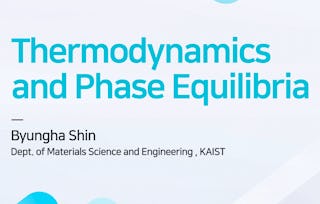Complex systems can exhibit emergent phenomena, wherein the interplay of simple underlying rules governing the constituent parts leads to rich and unexpected behavior of the whole. Condensed matter physics is the branch of physics devoted to understanding such emergence in physical systems. It is the largest subfield of physics, and has developed a wealth of ideas and techniques for taming complexity. The course provides an introduction to this physics of emergence.

Ends soon: Gain next-level skills with Coursera Plus for $199 (regularly $399). Save now.

Phases of Matter: Solid, Liquid, Gas and Beyond
This course is part of The Physics of Emergence: Introduction to Condensed Matter Specialization

Instructor: Rahul Nandkishore
Included with
(11 reviews)
Recommended experience
What you'll learn
Define what constitutes a phase of matter.
Interpret phases in terms of symmetries, and describe spontaneous symmetry breaking.
Identify the competition between energy and entropy, and explain how this produces phase transitions.
Skills you'll gain
Details to know

Add to your LinkedIn profile
See how employees at top companies are mastering in-demand skills

Build your subject-matter expertise
- Learn new concepts from industry experts
- Gain a foundational understanding of a subject or tool
- Develop job-relevant skills with hands-on projects
- Earn a shareable career certificate

There are 4 modules in this course
This module introduces the notion of emergent phenomena, and a central application of this notion: phases of matter. We define what constitutes a phase of matter, and explain that there are many phases beyond the familiar trio of solid, liquid, and gas.
What's included
8 videos1 reading4 assignments2 peer reviews4 discussion prompts
This module introduces the notion of symmetries, which provide a powerful tool for thinking about phases of matter. It also introduces the notion of spontaneous symmetry breaking.
What's included
8 videos4 assignments1 peer review4 discussion prompts
This module introduces the concepts of energy, entropy and explains how the competition between them can drive phase transitions.
What's included
7 videos3 assignments1 peer review2 discussion prompts
In this module, you will learn a powerful tool for analyzing phases that are classified by symmetries, known as mean field theory. You will learn to apply this tool.
What's included
9 videos3 assignments1 peer review3 discussion prompts
Earn a career certificate
Add this credential to your LinkedIn profile, resume, or CV. Share it on social media and in your performance review.
Instructor

Offered by
Explore more from Physics and Astronomy
 Status: Free Trial
Status: Free TrialUniversity of Colorado Boulder
 Status: Free Trial
Status: Free TrialUniversity of Colorado Boulder
 Status: Preview
Status: PreviewKorea Advanced Institute of Science and Technology(KAIST)
 Status: Free Trial
Status: Free TrialUniversity of Colorado Boulder
Why people choose Coursera for their career




Learner reviews
11 reviews
- 5 stars
81.81%
- 4 stars
18.18%
- 3 stars
0%
- 2 stars
0%
- 1 star
0%
Showing 3 of 11
Reviewed on Feb 20, 2024
Just enough complexity to keep the topic interesting and difficult.
Frequently asked questions
To access the course materials, assignments and to earn a Certificate, you will need to purchase the Certificate experience when you enroll in a course. You can try a Free Trial instead, or apply for Financial Aid. The course may offer 'Full Course, No Certificate' instead. This option lets you see all course materials, submit required assessments, and get a final grade. This also means that you will not be able to purchase a Certificate experience.
When you enroll in the course, you get access to all of the courses in the Specialization, and you earn a certificate when you complete the work. Your electronic Certificate will be added to your Accomplishments page - from there, you can print your Certificate or add it to your LinkedIn profile.
Yes. In select learning programs, you can apply for financial aid or a scholarship if you can’t afford the enrollment fee. If fin aid or scholarship is available for your learning program selection, you’ll find a link to apply on the description page.
More questions
Financial aid available,
¹ Some assignments in this course are AI-graded. For these assignments, your data will be used in accordance with Coursera's Privacy Notice.





